高中英语语法(句子成分和句型结构)
高中英语语法框架总结归纳
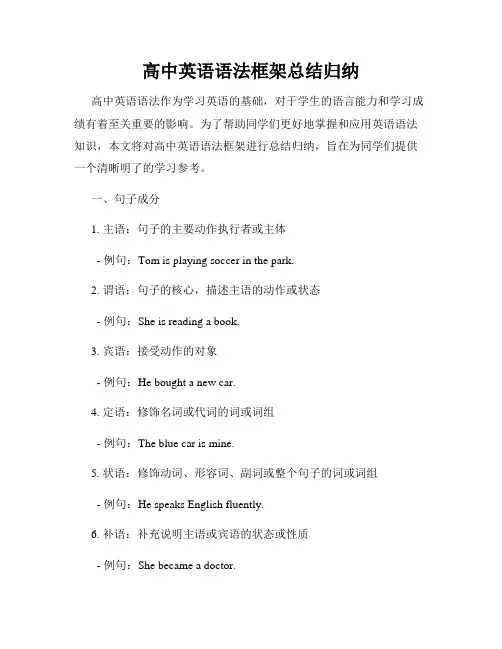
高中英语语法框架总结归纳高中英语语法作为学习英语的基础,对于学生的语言能力和学习成绩有着至关重要的影响。
为了帮助同学们更好地掌握和应用英语语法知识,本文将对高中英语语法框架进行总结归纳,旨在为同学们提供一个清晰明了的学习参考。
一、句子成分1. 主语:句子的主要动作执行者或主体- 例句:Tom is playing soccer in the park.2. 谓语:句子的核心,描述主语的动作或状态- 例句:She is reading a book.3. 宾语:接受动作的对象- 例句:He bought a new car.4. 定语:修饰名词或代词的词或词组- 例句:The blue car is mine.5. 状语:修饰动词、形容词、副词或整个句子的词或词组- 例句:He speaks English fluently.6. 补语:补充说明主语或宾语的状态或性质- 例句:She became a doctor.二、时态与语态1. 现在时态- 表示现在或经常性的动作或状态- 例句:I eat breakfast every morning.2. 过去时态- 表示过去发生或存在的动作或状态- 例句:They went to the beach last summer.3. 将来时态- 表示将来发生或存在的动作或状态- 例句:We will visit our grandparents next month.4. 一般语态- 主语是动作的执行者- 例句:She reads books every day.5. 被动语态- 主语是动作的承受者,强调动作对主语的影响 - 例句:The book was written by him.三、句型结构1. 简单句- 只包含一个主语和一个谓语- 例句:He plays basketball.2. 并列句- 由两个或多个主谓结构相连而成- 例句:I like apples, and he likes oranges.3. 复合句- 由一个主句和一个或多个从句构成- 例句:I will go to the park if it doesn't rain.四、从句类型1. 名词性从句- 作为主语、宾语或表语的从句- 例句:What he said is true.2. 定语从句- 修饰名词或代词的从句- 例句:The book that I borrowed from the library is interesting.3. 状语从句- 作为状语修饰整个句子的从句- 例句:She studied hard because she wanted to get good grades.五、语法规则1. 一般现在时的第三人称单数形式- 动词加s或es- 例句:She watches TV every night.2. 动词的时态与主语的人称保持一致- 例句:I am studying English. (一般现在时,第一人称单数) 3. 动词的不同时态和语态需要变换助动词和时态形式- 例句:He will be invited to the party. (将来被动语态)4. 形容词和副词的比较级和最高级形式- 一般加-er和-est,或在词前加more和most- 例句:She is taller than her sister.六、注意事项1. 引导不同从句的连词需正确使用- 例句:I don't know where he lives.2. 注意主谓一致和代词的正确使用- 例句:Everyone should do their own homework.3. 学会正确使用标点符号- 例句:We have a good teacher, Mr. Smith.总结:高中英语语法框架是学习英语的基石,掌握语法规则和句型结构对于提高英语能力至关重要。
(整理版高中英语)高考英语语法复习专题资料句子结构及成分
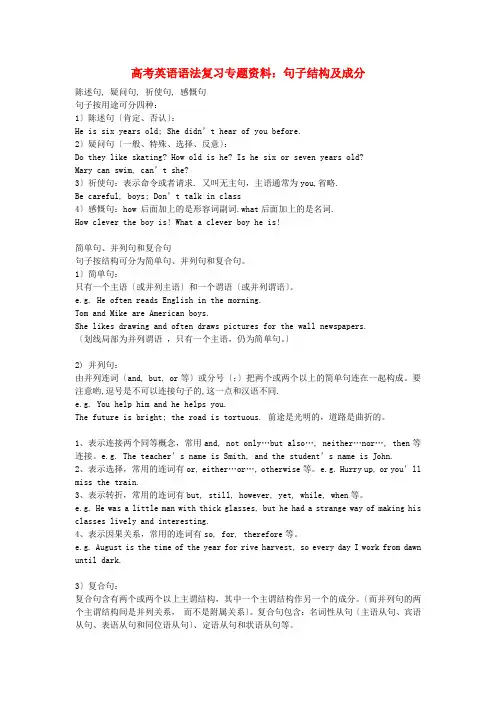
高考英语语法复习专题资料:句子结构及成分陈述句, 疑问句, 祈使句, 感慨句句子按用途可分四种:1〕陈述句〔肯定、否认〕:He is six years old; She didn’t hear of you before.2〕疑问句〔一般、特殊、选择、反意〕:Do they like skating? How old is he? Is he six or seven years old?Mary can swim, can’t she?3〕祈使句:表示命令或者请求. 又叫无主句,主语通常为you,省略.Be careful, boys; Don’t talk in class4〕感慨句:how 后面加上的是形容词副词.what后面加上的是名词.How clever the boy is! What a clever boy he is!简单句、并列句和复合句句子按结构可分为简单句、并列句和复合句。
1〕简单句:只有一个主语〔或并列主语〕和一个谓语〔或并列谓语〕。
e.g. He often reads English in the morning.Tom and Mike are American boys.She likes drawing and often draws pictures for the wall newspapers.〔划线局部为并列谓语,只有一个主语,仍为简单句。
〕2) 并列句:由并列连词〔and, but, or等〕或分号〔;〕把两个或两个以上的简单句连在一起构成。
要注意哟,逗号是不可以连接句子的,这一点和汉语不同.e.g. You help him and he helps you.The future is bright; the road is tortuous. 前途是光明的,道路是曲折的。
1、表示连接两个同等概念,常用and, not only…but also…, neither…nor…, then等连接。
高中英语语法复习:句子结构及句型 主谓一致(无答案)
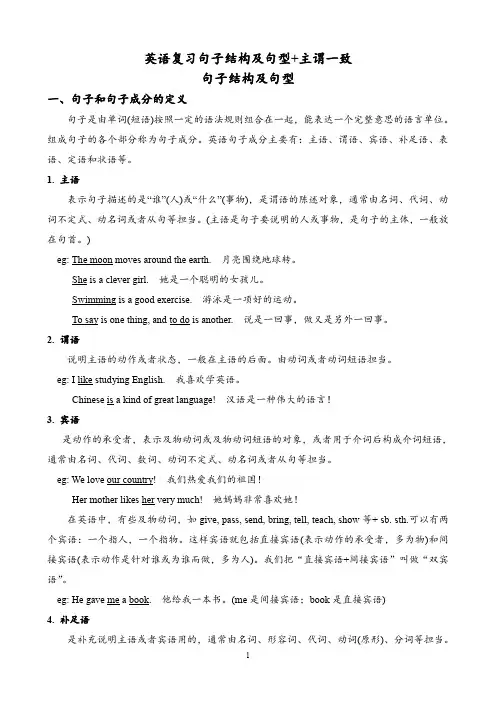
英语复习句子结构及句型+主谓一致句子结构及句型一、句子和句子成分的定义句子是由单词(短语)按照一定的语法规则组合在一起,能表达一个完整意思的语言单位。
组成句子的各个部分称为句子成分。
英语句子成分主要有:主语、谓语、宾语、补足语、表语、定语和状语等。
1. 主语表示句子描述的是“谁”(人)或“什么”(事物),是谓语的陈述对象,通常由名词、代词、动词不定式、动名词或者从句等担当。
(主语是句子要说明的人或事物,是句子的主体,一般放在句首。
)eg: The moon moves around the earth. 月亮围绕地球转。
She is a clever girl. 她是一个聪明的女孩儿。
Swimming is a good exercise. 游泳是一项好的运动。
To say is one thing, and to do is another. 说是一回事,做又是另外一回事。
2. 谓语说明主语的动作或者状态,一般在主语的后面。
由动词或者动词短语担当。
eg: I like studying English. 我喜欢学英语。
Chinese is a kind of great language! 汉语是一种伟大的语言!3. 宾语是动作的承受者,表示及物动词或及物动词短语的对象,或者用于介词后构成介词短语,通常由名词、代词、数词、动词不定式、动名词或者从句等担当。
eg: We love our country! 我们热爱我们的祖国!Her mother likes her very much! 她妈妈非常喜欢她!在英语中,有些及物动词,如give, pass, send, bring, tell, teach, show等+ sb. sth.可以有两个宾语:一个指人,一个指物。
这样宾语就包括直接宾语(表示动作的承受者,多为物)和间接宾语(表示动作是针对谁或为谁而做,多为人)。
我们把“直接宾语+间接宾语”叫做“双宾语”。
高中英语语法精讲:基本句子结构之句子成分
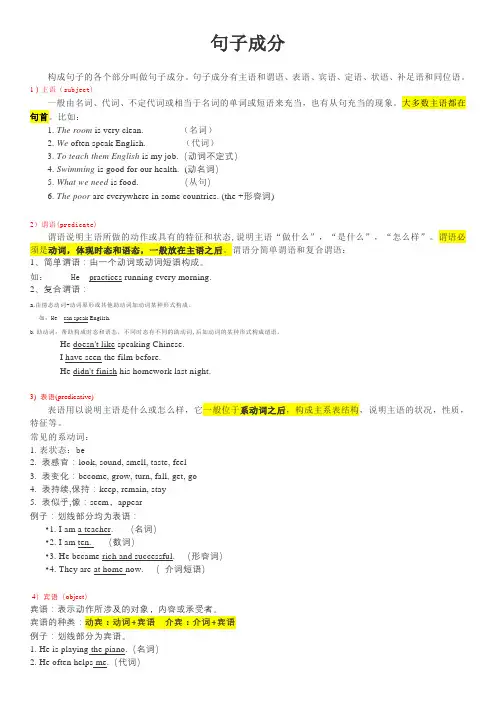
句子成分构成句子的各个部分叫做句子成分。
句子成分有主语和谓语、表语、宾语、定语、状语、补足语和同位语。
1)主语(subject)一般由名词、代词、不定代词或相当于名词的单词或短语来充当,也有从句充当的现象。
大多数主语都在句首。
比如:1. The room is very clean. (名词)2. We often speak English. (代词)3. To teach them English is my job.(动词不定式)4. Swimming is good for our health. (动名词)5. What we need is food. (从句)6. The poor are everywhere in some countries. (the +形容词)2)谓语(predicate)谓语说明主语所做的动作或具有的特征和状态,说明主语“做什么”,“是什么”,“怎么样”。
谓语必须是动词,体现时态和语态,一般放在主语之后。
谓语分简单谓语和复合谓语:1、简单谓语:由一个动词或动词短语构成。
如: He practices running every morning.2、复合谓语:a.由情态动词+动词原形或其他助动词加动词某种形式构成。
如:He can speak English.b. 助动词:帮助构成时态和语态,不同时态有不同的助动词,后加动词的某种形式构成谓语。
He doesn't like speaking Chinese.I have seen the film before.He didn't finish his homework last night.3) 表语(predicative)表语用以说明主语是什么或怎么样,它一般位于系动词之后,构成主系表结构,说明主语的状况,性质,特征等。
常见的系动词:1. 表状态:be2. 表感官:look, sound, smell, taste, feel3. 表变化:become, grow, turn, fall, get, go4. 表持续,保持:keep, remain, stay5. 表似乎,像:seem,appear例子:划线部分均为表语:•1. I am a teacher. (名词)•2. I am ten. (数词)•3. He became rich and successful. (形容词)•4. They are at home now. (介词短语)4)宾语(object)宾语:表示动作所涉及的对象,内容或承受者。
高中英语语法_句子成分

Our teacher encouraged us to work hard. The boy made his sister cry.
以上五种基本句型中的主语、宾语、表语都可 扩展成相应的从句,从而成为复合句。同时, 复合句中的主、从句也是由以上五种基本句型 组成的。如: What he says doesn’t agree with what he does. Why he came late is that his bike broke down on the way. It occurred to me that I had much work to do. He promised me that he would attend the lecture. What has made the city what it is now?
2.谓语: 说明主语的动作或所处的状态。 谓语 (predicate) 或谓语动词(predicate verb) 的位置一般 在主语之后。谓语由简单动词或动词短语(助动词或 情态动词+主要动词)构成。
1)
The new term begins on the 1st of September. 2) I would like to invite all my friends here. 3) I have tried this way three times. 4) We should pay attention to the English idioms. 5) He is working in the garden.
7.状语:修饰动词、形容词、副词或全句,说明方式、
1)
因果、条件、时间、地点、让步、方向、程度、目的等。
英语语法之句子成分及句子结构
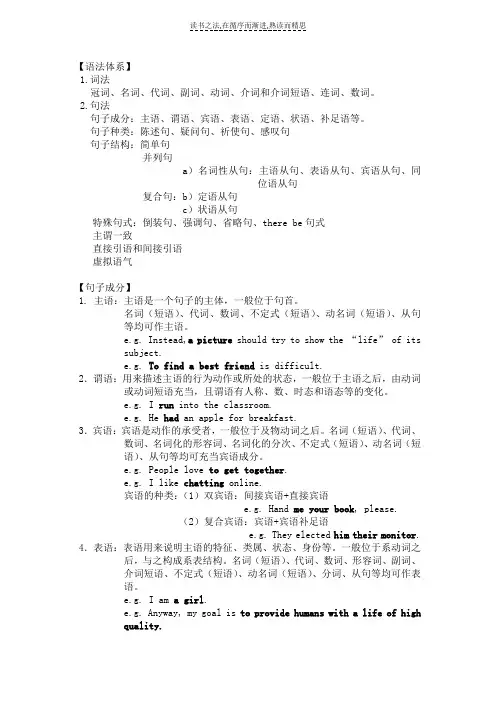
【语法体系】1.词法冠词、名词、代词、副词、动词、介词和介词短语、连词、数词。
2.句法句子成分:主语、谓语、宾语、表语、定语、状语、补足语等。
句子种类:陈述句、疑问句、祈使句、感叹句句子结构:简单句并列句a)名词性从句:主语从句、表语从句、宾语从句、同位语从句复合句:b)定语从句c)状语从句特殊句式:倒装句、强调句、省略句、there be句式主谓一致直接引语和间接引语虚拟语气【句子成分】1.主语:主语是一个句子的主体,一般位于句首。
名词(短语)、代词、数词、不定式(短语)、动名词(短语)、从句等均可作主语。
e.g. Instead,a picture should try to show the “life” of itssubject.e.g. To find a best friend is difficult.2.谓语:用来描述主语的行为动作或所处的状态,一般位于主语之后,由动词或动词短语充当,且谓语有人称、数、时态和语态等的变化。
e.g. I run into the classroom.e.g. He had an apple for breakfast.3.宾语:宾语是动作的承受者,一般位于及物动词之后。
名词(短语)、代词、数词、名词化的形容词、名词化的分次、不定式(短语)、动名词(短语)、从句等均可充当宾语成分。
e.g. People love to get together.e.g. I like chatting online.宾语的种类:(1)双宾语:间接宾语+直接宾语e.g. Hand me your book, please.(2)复合宾语:宾语+宾语补足语e.g. They elected him their monitor. 4.表语:表语用来说明主语的特征、类属、状态、身份等。
一般位于系动词之后,与之构成系表结构。
名词(短语)、代词、数词、形容词、副词、介词短语、不定式(短语)、动名词(短语)、分词、从句等均可作表语。
新外研版高一必修一unit1语法(句子的成分和五种句型)
简单句的五种基本结构以及句子成分了解中英文思维的差别中文重“意”,英文重“形”共同点:陈述对象+陈述内容即主+ 谓(主干)建议:在复习复杂的难句结构时,首先要找到句子的谓语,包括主句的谓语以及各个从句的谓语。
Another way of naming places is naming them after other places. Perhaps they were named to promote friendships between the two places or it could be that the people who used to live there were originally from the places that the roads were named after.(另一个命名地方的方式是以其他地方命名。
也许他们的名字是为了促进两地之间的友谊,也可能是原来住在那里的人是来自于道路得名的地方。
)英语句型的结构:主干+其他成分(从句,介短,非谓,时状)A man was standing at a bus stop eating fish and chips. An old lady and herlittle white dog stood next to him. The dog, excited by the smell of the fish and chips, started to bark and jump up on the man’s leg.“Do you mind if I throw him a bit?”“Not at all,” she said. “Go ahead.”So the man picked up the little dog and threw it over a wall.简单句的五种基本结构以及句子成分句型一、主谓成分一:主语一个句子所叙述的主体,一般位于句首。
高中英语语法专题一: 英语语法框架 句子成分讲解和练习(word版 含答案)
Part 1:英语语法框架一·词法:词法研究的对象是各种词的形式及其用法。
英语词类的形式变化有:名词和代词的数,格和性的形式变化;动词的人称、时态、语态、语气等形式变化;以及形容词和副词比较等级的形式变化。
种类:1 名词:是人和事物的名称,如pen(钢笔);English(英语),life(生活)。
2 代词:是用来代替名词的词,如we(我们),his(他的),all(全部)。
3 副词: 是修饰动词、形容词和副词的词,如quickly(快),often(经常),very(很)。
4 数词:是表示“多少”和“第几”的词,如four(四),eighteen(十八),first(第一)5 形容词:用来修饰名词,如great(伟大的),honest(诚实的),difficult(困难的)。
6 动词: 表示动作和状态,如write(写),walk(行走),think(想)。
7 连词: 是连接词、短语、从句和句子的词,如and(和),because(因为),if(假如)8 冠词: 说明名词所指的人或物的词,如a,an(一个),the(这,那)。
9 介词: 表示名词(或代词)与句子里其它词的关系,如from(从),in(在…内),between(在…之间)。
10 感叹词: 表示感情,如oh(噢),aha(啊哈),hush(嘘)。
[注一]属于前六类(名、代、副、数、形、动等词)的词都有实义,叫做实词。
属于后四类(连、冠、介、感等词)的词没有实义,叫做虚词。
[注二]不少词可以属于几个词类,如work(工作;动词和名词),fast(快,形容词和副词),since(自从;连词和介词)等。
构词法定义:构词法是研究怎样造词的学问。
掌握构词法有助于记忆单词,扩大词汇量。
英语单词看似海量,其实真正“原生态”的数量有限,而大量的都是通过构词法造出来的。
如:Foot (足) + ball (球) ------football 足球Sea (海) + food ( 食品) -----seafood 海鲜食品种类:英语最基本的构词法有三种:派生,合成和转化。
专题二-高中英语语法句子结构成分分析主语谓语宾语定语状语补语
高中英语语法1. 句子结构成分分析主语谓语宾语定语状语补语定语1英语的句子成分主要有六种:即主语、谓语、宾语、定语、状语和补语。
(可以熟记为:主谓宾,定状补)除了这六种主要成分之外,还有“表语”和“同位语”的说法。
但表语和系动词一起作谓语,因此划分成分时,划分在谓语上。
同位语分为主语同位语和宾语同位语,属于主语或宾语的一部分。
考点1.划分句子成分时的常用符号英语中划分句子成分的符号主语在下面画直线谓语在下面画曲线宾语在下面画双横线定语在下面画虚线(一行点使我们想到一排钉子,“钉”谐音为“定语”的“定”)状语下面为短横线(短横线使我们想到短木桩,木桩撞(状)钟)补语上一短横,下一短横(下一短横好像是为了弥补上面短横间的空隙)同位语上下双曲线(都有曲折,上下位置基本相同)考点1.主语主语是一个句子所叙述的主体,一般位于句首,通常由名词性的词来充当。
可以作主语的词性或语法结构:1. 名词2. 代词3. 数词4. 不定式5. 动名词6. 主语从句等表示。
7. 名词化的形容词(如the rich)在英语中,形容词、副词和介词短语是不能作主语的。
如果它们在句首时,句子可能是倒装句,真正的主语在后面。
On the desk are some books. (主语是books,所以用are)Down jumps the boy. (主语是the boy,所以用jumps )Gone are the days. (主语是the days,所以用are)练习1.在下面句子的主语下面画横线,并说出由什么充当。
1.During the 1990s, American countrymusic has become more and morepopular.2.We often speak English in class.3.One-third of the students in thisclass are girls.4.To swim in the river is a greatpleasure.5.Smoking does harm to the health.6.The rich should help the poor.7.When we are going to have English testhas not been decided.8.It is necessary to master a foreignlanguage.9.That he isn’t at home is not true.10.There comes the bus.11.Beyond the village lies a smallvillage.12.Now comes your turn.考点2.谓语谓语由动词充当,说明主语所做的动作或具有的特征和状态。
高中英语语法(全)讲义精讲
高一英语语法讲义一、句子成分及简单句五种基本句型一、句子成分(一)句子成分的定义:构成句子的各个部分叫做句子成分。
句子成分有主要成分和次要成分;主要成分有主语和谓语;次要成分有表语、宾语、定语、状语、补足语和同位语。
(二)主语:主语是一个句子所叙述的主体,一般位于句首。
但在there be结构、疑问句(当主语不是疑问词时)和倒装句中,主语位于谓语、助动词或情态动词后面。
主语可由名词、代词、数词、不定式、动名词、名词化的形容词和主语从句等表示。
例如:During the 1990s, American country music has become mo re and more popular.(名词)We often speak English in class.(代词)One-third of the students in this class are girls.(数词)To swim in the river is a great pleasure.(不定式)Sm oking does harm to the health.(动名词)The ri ch should help the poor.(名词化的形容词)When we are going to have an English test has not been decided.(主语从句)It is necessary to master a foreign language.(it作形式主语,真正的主语为后面的不定式)(三)谓语:谓语说明主语所做的动作或具有的特征和状态。
动词在句中作谓语,一般放在主语之后。
谓语的构成如下:1、简单谓语:由一个动词或动词短语构成。
如:He practices running every morning.2、复合谓语:(1)由情态动词或其他助动词加动词原形构成。
如:You may keep the book for two weeks. He has caught a bad cold. (2)由系动词加表语构成。
- 1、下载文档前请自行甄别文档内容的完整性,平台不提供额外的编辑、内容补充、找答案等附加服务。
- 2、"仅部分预览"的文档,不可在线预览部分如存在完整性等问题,可反馈申请退款(可完整预览的文档不适用该条件!)。
- 3、如文档侵犯您的权益,请联系客服反馈,我们会尽快为您处理(人工客服工作时间:9:00-18:30)。
Unit 15 句子成分和句型结构【高考考点透析】1、简单句的五大句型是最基本的句型。
虽然近几年单纯考查这种基础句型的题不多,但是在阅读中有时需借助于划分句子成分去理解,在书面表达中,没有最基本的遣词造句的能力是不可能用地道的英语句子来表达清楚的。
2、祈使句、反意疑问句和感叹句是高考命题的热点之一。
有时把祈使句与反意疑问句结合于一体来考查。
一个题目,几个考点,是近几年命题的发展趋势。
3、高考对简单句、并列句和各种复合句的考查常表现在对连词的选择和使用上。
如:and, but, or, while,以及其它连接名词性从句、定语从句和状语从句的连接词、关联词。
4、各种主从复合句的考查常常与动词的时态联系在一起,以宾语从句与状语从句最为明显,时间从句与条件从句中,如果主句是将来时,从句则用一般式表将来,这一点在高考中经常考查。
一、句子的成分构成句子的基本成分叫做句子成分。
句子成分可分为主语,谓语,宾语,表语,定语,状语,同位语。
它们可以由单词来担任,也可以由词组,以及句子来担任。
(一)主语:主语是一个句子中所要表达,描述的人或物,是句子的主体。
主语可以由名词,代词,数词,动词不定式,动名词,名词化形容词,分词,从句,短语等来担任。
The book is on the desk.I get an idea.Two and two are four.Smoking is bad to health.(二) 谓语:谓语是用来说明主语做了什么动作或处于什么状态。
谓语可以由动词来担任,一般放在主语的后面。
The child has been brought up by his mother.She speaks English fluently.(三) 表语:表语是用来说明主语的性质,身份,特征和状态。
表语须贺连系动词一形容词作用的词和起构成句子的复合谓语。
表语一般放在系动词之后。
表语可以由名词,形容词或起名词和形容词作用的词或短语担任。
These desks are yellow.We are happy now.She is ten.(四)宾语:宾语是谓语动词动作所涉及的对象,它是动作的承受着,宾语可以由名词或起名词作用的成分担任,宾语一般放在谓语动词后面。
I saw a cat in the tree.He said he could be here.有些及物动词可以有两个宾语,其中一个宾语多指人,另一个宾语指物,指人的宾语叫做间接宾语,指物的宾语叫做直接宾语,可以带两个宾语的动词有bring, give, show, send, pass, tell 等。
间接宾语一般放在直接宾语的前面,但间接宾语前须加“to”。
My father bought me a book.Please give the letter to Xiao Li.有些及物动词除跟一个宾语外,还需要加上宾语补足语,否则意思不完整,它们一起构成符合宾语,符合宾语中宾语和后面的宾语补足语有一种逻辑上的主谓关系,这也是判断是两个宾语还是符合宾语的依据,宾语可以由名词或起名词作用的词担任。
We all call him Lao Wang.We found the little girl in the hill.(五)定语:用于描述名词,代词,短语或从句的性质,特征范围等情况的词叫做定语,定语可以由名词,形容词和起名词和形容词作用的词,短语担任。
如果定语是单个词,定语放在被修饰词的前面,如果是词组,定语放在被修饰词的后面。
That is a beautiful flower.The TV set made in that factory is very good.(六)状语:说明事物发生的时间,地点,原因,目的,结果方式,条件或伴随情况,程度等情况的词叫状语。
状语可以由副词,短语以及从句来担任。
We went to the countryside last year.We study hard for our country.I’m late because I missed the bus.二、句子的分类(一)两种句子分类法1、按句子的用途可分四种:1)陈述句(肯定、否定):He is six years old; She didn’t hear of you before.2)疑问句(一般、特殊、选择、反意):Do they like skating? How old is he? Is he six or seven years old? Mary can swim, can’t she?3)祈使句:Be careful, boys; D on’t talk in class4)感叹句:How clever the boy is!2、按句子的结构可分三种:1)简单句:只有一个主语(或并列主语)和一个谓语(或并列谓语)。
e.g. He often reads English in the morning.Tom and Mike are American boys.She likes drawing and often draws pictures for the wall newspapers.2) 并列句:由并列连词(and, but, or等)或分号(;)把两个或两个以上的简单句连在一起构成。
e.g. You help him and he helps you.The future is bright; the road is tortuous. 前途是光明的,道路是曲折的。
3)复合句:含有一个或一个以上从句的句子。
复合句包含:名词性从句(主语从句、宾语从句、表语从句和同位语从句)、定语从句和状语从句等。
e.g. The foreign visitors took a lot of pictures when they were at the Great Wall.三、简单句的五种基本句型Ⅰ 主语+系动词+表语:e. g. He is a student.Ⅱ 主语+不及物动词:e. g. We work.Ⅲ 主语+及物动词+宾语:e. g. Henry bought a dictionary.Ⅳ 主语+及物动词+双宾语(间接宾语+直接宾语):e. g. My father bought me a car.Ⅴ 主语+及物动词+复合宾语(宾语+宾补):e. g. Tom made the baby laugh.注:其他各种句子都可由这一种基本句型扩展、变化或省略而构成。
Ⅰ主语+系动词+表语S│V(系动词)│ P在这一句型中,动词是系动词,划线部分为表语。
Eg. 1. Mr. Brown is an engineer. (名词作表语)2. Gradualy he became silent. (形容词作表语)3. She remained standing for a hour. (现在分词作表语)4. The question remained unsolved. (过去分词作表语)5. The machine is out of order. (介词短语作表语)6. The television was on. (副词作表语)7. His plan is to keep the affair secret. (动词不定式作表语)8. My job is repairing cars. (动名词作表语)Exerciseⅰ划分下列句子成份1. This │is │an English-Chinese dictionary. 这是本英汉辞典。
2. The dinner │smells │good. 午餐的气味很好。
3. He │fell │in love. 他堕入了情网。
4. Everything │looks │different. 一切看来都不同了5. He │is growing │tall and strong. 他长得又高又壮6. The troub le│is │that they are short of money. 麻烦的是他们缺少钱。
7. Our well │has gone │dry. 我们井干枯了。
8. His face │turned │red. 他的脸红了。
Ⅱ主语+不及物动词S│ V(不及物动词)Eg. 1. The sun is rising.2. I’ll try.3. Did you sleep well?(well做状语,修饰不及物动词sleep)4. The engine broke down.这种句型中的动词大多是不及物动词,这些动词常见的有:appear, apologize, arrive, come, die, disappear, exist, fall, happen, rise,等等。
如:1). 学生们学习很努力。
_____________________________________2). 她再次向我道歉。
_______________________________________3). 事故是昨天晚上发生的。
_____________________________________补充: 少数不及物动词后面能跟一个相同意义的名词作宾语,这个名词和前面的动词在词根上是相同的或者在意义上是相近的,这样的宾语就叫做同源宾语。
常见的能带同源宾语的动词有:lead, live, die, sleep, dream, breathe, smile, laugh, fight, run, sing 等。
例如:4). Under the leadership of the Party, the peasants lead a happy life._______________________________________________________________________。
5). I dreamed a terrible dream last night. __________________________________________。
6). Our soldiers fought a wonderful fight against the floods last August.______________________________________________________________________。
7). He died a glorious death. _____________________________________________________。
